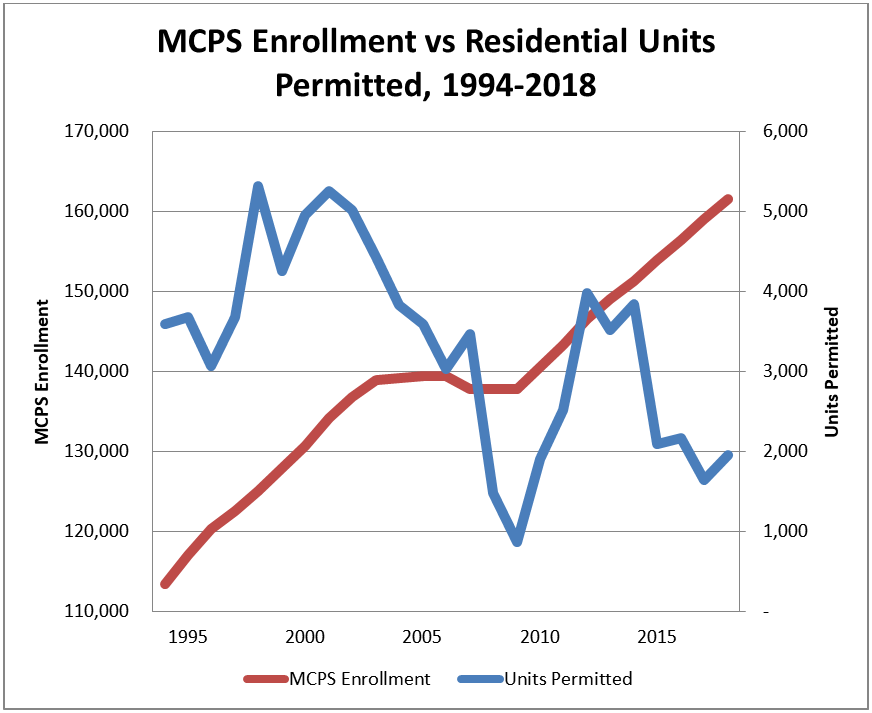By Adam Pagnucco.
The Montgomery County government is currently plagued by a $100 million operating budget shortfall and a shrinking capital budget. So what is the county doing to revitalize its economy and earn more revenue?
Potentially, imposing more moratoriums on housing construction!
County development rules require moratoriums on housing construction inside school clusters or individual school service areas when projected public school enrollment accounts for 120% or more of capacity five years into the future. Additionally, elementary schools must be 110 students over capacity and middle schools must be 180 students over capacity to trigger moratoriums. Projects that are already approved are not halted by moratoriums but new project approvals are not granted.
Last year, the county imposed moratoriums on four high school clusters and 13 individual elementary school service areas. Those areas accounted for roughly 12% of the county and included high-profile markets in Downtown Silver Spring and North Bethesda, thereby directly thwarting the county’s transit-oriented development strategy.
The problem with stopping residential development is that school impact taxes collected from new units can be a major source of revenue for school construction. As recently as the FY15-20 amended capital budget, school impact taxes accounted for 15% of MCPS’s school construction budget. Unfortunately, that is no longer the case.
In a memo to the Montgomery County Planning Board, planning staff noted that the county executive’s new recommended FY21-26 capital budget underfunds MCPS’s construction request by $61 million in FY21, $93 million in FY22, $93 million in FY23 and $57 million in FY24. One of the biggest reasons for the underfunding is that school impact tax receipts have fallen by more than half since FY14. The planning staff indicates that if the underfunding results in delayed projects, nine elementary school service areas (Bethesda, Clarksburg, JoAnn Leleck, Rachel Carson, Strawberry Knoll, Summit Hall, McNair, Page and Burnt Mills), one middle school service area (Parkland) and seven high school clusters (Quince Orchard, Richard Montgomery, Albert Einstein, Montgomery Blair, Blake, Northwood, Walter Johnson) may be at risk of moratoriums. For the Blake, Blair, Einstein and Walter Johnson clusters, this would be the second straight year of moratorium, threatening projects in North Bethesda and Downtown Silver Spring.
The cruel fact here is that reducing residential construction has historically had little if any impact on MCPS enrollment increases. The chart below shows MCPS enrollment (red line and left axis) and residential units permitted in Montgomery County (blue line and right axis) from 1994 through 2018. MCPS enrollment comes from the county executive’s recommended budget while permitted units comes from the U.S. Census Bureau. Over this 24 year period, housing construction has been falling while MCPS enrollment has been rising. The contrast between the two trends has been most pronounced in recent years. Housing units permitted has fallen from 3,981 in 2012 to 1,947 in 2018 while MCPS enrollment has grown from 146,497 to 161,470. It defies logic to blame school crowding on housing construction when homebuilding is in an era of decline.

And so here is the effect of MoCo’s moratorium policy. Housing construction drops, causing school impact tax payments to plummet and depriving school construction of needed funding. The county reacts by delaying school projects, triggering moratoriums. That causes housing construction to decline further and the cycle continues. None of this helps more schools get built but it definitely constrains housing supply, thereby driving up home prices and making the county even more unaffordable to live in than it already is. Another effect is that it makes the county radioactive to the real estate and investment communities, thereby pushing them into competing jurisdictions. It’s no wonder that Prince George’s County Executive Angela Alsobrooks is celebrating her county’s passing of Montgomery County in job creation.
Using residential moratoriums to prevent school crowding is like treating lung cancer by amputating the patient’s legs. The treatment does nothing to solve the original problem but it definitely causes new problems to arise!
If you wanted to stop economic growth and make it harder for people to live here, it would be difficult to devise something more attuned to such goals than MoCo’s insane moratorium policy. The county must bring it to an end.
